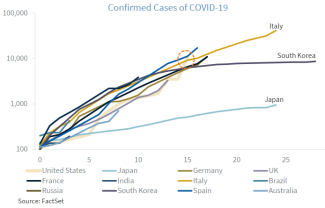|
I hope all of you are safe, healthy and keeping sane in these unnerving times. Yesterday we notified all clients of our contingency plans to work remotely for the foreseeable future. Our contingency plans have been implemented. We do not anticipate any disruptions to phone calls, meetings or money movement.
Please know we are focused on your investments and financial well-being. We are in uncertain times, and we are here for you. Please do not hesitate to contact us.
Black Swan /ˌblak ˈswän/ -- A black swan is an unpredictable event that is beyond what is normally expected of a situation and has potentially severe consequences.
What a difference two weeks can make. In my last market update email on March 10, economists and investors were hoping the economic effects of COVID-19 would be short-lived, and a “V” shaped downturn and recovery was possible. Though it is still possible for a fast recovery, most economists are now predicting a sharp recession accompanied by a longer recovery… or “U” shaped recovery.
Investors of all stripes have awoken to the possibilities of a prolonged period of self-quarantine, substantial layoffs and a recession. Restricting human contact for far more than a couple of weeks now looks probable and will harm our economy. Thankfully, the U.S. Federal Reserve has stepped in with a forceful range of responses to help keep financial markets functioning. Plus, central banks around the world are trying to combat the self-imposed slowdown. Beyond this though, massive government spending is the primary tool at this point to help mitigate the economic fallout. Thankfully, the U.S. government is poised to pass a spending bill to help families and small businesses navigate these difficult times. Most economists, and even some politicians, believe the current bill will not be enough, but it is a good start. Unfortunately, more money will need to be spent, and more quickly, to prop up the U.S. and global economy.
The range of outcomes for our collective health and economy are seemingly wide at the present moment. Though I firmly believe our economy and portfolios will recover, both may take months to a few years to do so. As we have said over the past two years, the possibility of a bear market was rising, given the degrading financial conditions (e.g. too much corporate and government debt, along with the limited ability to substantially cut interest rates to help stimulate the economy). However we, like the rest of world, did not foresee an economic and financial contraction due to a pandemic.
At this point, we expect the economic pain to increase over the next three to six months. Financial markets may start to rebound before the recession is over, but we expect the stock market to fall further from here. While we hope COVID-19 is quickly brought under control and life soon returns to normal, we are advocating caution since the length and severity of the virus and its effects on our global economy are highly uncertain.
Collectively as humans and Americans, we will no doubt get through this, but it will take time. Life will return to normal. However, how COVID-19 plays out is uncertain, and I view it as my job to prepare all of us for the possibility of a longer-than-anticipated downturn, if it materializes. As mentioned before, we have discussed the possibility of a bear market and have developed client-specific game plans should a downturn occur.
What follows is some general guidance for all of us during these uncertain times. After this, I will go into more detail regarding the virus, economy and financial markets.
Also, the Raymond James video from Monday is well-done. I would encourage you to take some time to watch the video. A link to the video is below.
|

